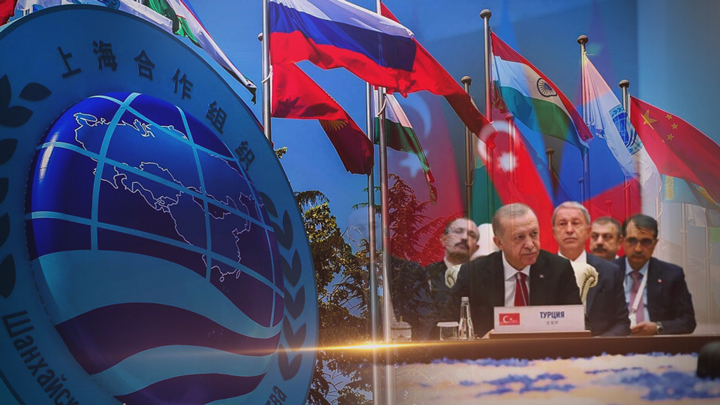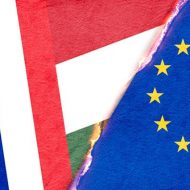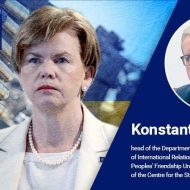The motto “America must not leave us, otherwise Russia will come” was used by far-right organizations in Turkiye in the 1970s that were governed by the US Gladio.
Thankfully, it is no longer possible to openly defend America. The “conservative” parts of Turkiye have been dramatically freed from the US’s intellectual control after the coup attempt on July 15th, 2016, was crushed. It became very evident that the NATO and US are adversaries of the Turkish state and people.
It is noteworthy the supporters of the US and NATO in Turkiye are trying to disguise themselves as anti-Russian and anti-Chinese. Moreover, Americanism now manifests itself in the form of denigrating international organizations in which Turkiye can take part as an independent and sovereign country, equating them with NATO.
However, the BRICS and the SCO are the opposite of NATO and the EU, moreover, they are as well as the antidote.
You have to give up sovereignty when joining NATO and the EU
The BRICS and SCO are becoming more successful and influential. The world is now multipolar because of the success of these two organizations.
That sworn NATO and EU propagandists and G7 officials persistently spread the lie that the BRICS and the SCO are just variants of NATO and the EU is an attempt to obscure the most important fact of our time.
And, unfortunately, their “enablers” in Türkiye are constantly trying to draw parallels between the SCO and NATO. However, the BRICS and the SCO are completely different organizations from NATO and the EU, not only in terms of their programs but also in terms of their rules, functioning, and goals!
In fact, the summits and other events of the SCO and BRICS are not at all like NATO and the G7, where countries always think alike and speak with the same voice on every issue.
In alliances like the G7 and NATO, everyone depends on “a single leader”. The reality that their summits only ratify the choices previously made in Washington is hidden by the joyful look they give off. This is why President Erdoğan’s statements before every NATO summit are reversed when he attends the summit.
The reason why the SCO and BRICS summits are different is that these organizations are truly institutions of sovereign states and each member legitimately defends its own national interests and preferences.
NATO is an offensive organization, not a defensive one
NATO was established to keep Europe under US control. From its inception, it was an offensive organization, not a defensive one. Parallel states within its member states have been established as “Super NATO” organizations to ensure that NATO members remain under the control of the US. The March 12, 1971, and September 12, 1980, military coups and the July 15 2016 coup attempt in Turkiye are the bitter proofs of this.
NATO promotes “free market” economics, liberalism, and Western individualistic and consumerist culture in order for the US to retain global dominance. It has dubbed itself the guardian of the ostensibly “Free World” in order to establish these principles as dominant. From the outset, it is exclusive, antagonistic, and confrontational. While maintaining control over its member nations, it deems itself authorized to intervene in the internal affairs of other countries and does so on a regular basis. When it fails to obtain the intended outcomes, it resorts to armed action to accomplish its goals.
NATO is a legally bound alliance. It has given itself permission to defend the interests of the United States. Members that join NATO or the EU give up their sovereign rights to these organizations.
Sovereignty is not surrendered in the BRICS and the SCO
In contrast, the SCO and BRICS are built on the “Shanghai Spirit” philosophy of mutual trust, mutual benefit, equality, consultation, respect for the diversity of civilizations, and the pursuit of common development. It is open to all and is ready to cooperate with countries around the world on the basis of these principles. It embraces consultation and inclusiveness in decision-making and operates on a consensus-based model. Every nation is sovereign and being a member of BRICS and SCO does not limit its sovereignty.
The SCO is able to accommodate Pakistan and India despite their great differences and even conflicts because of the “partnership while preserving sovereignty” attitude. China and India have border conflicts but work in harmony in both the BRICS and the SCO.
The SCO is special in that the hierarchy of the group is not based on the allocation of power among its members. Since the organization’s inception in 2001, none of the original member nations has taken the initiative to draft the organization’s guidelines. The SCO doesn’t have a “master” who makes everyone abide by the organization’s regulations!
Each new circumstance determines how the SCO’s rules should be written. As a result, it is unavoidably an extremely flexible framework. No one is holding anyone back or balancing the other within the SCO and BRICS.
We are dealing with an entirely new kind of organization in the SCO and BRICS. Every step of the SCO is an entirely novel event that has never occurred in the annals of world politics.
Thus, after 22 years of development, the SCO has turned into a “big family” with nine member states, three observer states, and 14 dialogue partners, totaling 26 members. Also, Turkiye is part of this big family.
BRICS, on the other hand, already has half of the world’s population and a quarter of the world’s production. BRICS, which will expand with the accession of Argentina, Algeria, Egypt, Iran, Iran, Saudi Arabia, Bangladesh, Guinea-Bissau, and Indonesia, has become a successful alliance of the oppressed southern countries.
The Ukraine conflict showed the difference between NATO and the SCO
The Russia-Ukraine conflict has highlighted the difference between NATO and the SCO. Although Russia is a member of the SCO and BRICS, all member states of both organizations are free to make independent decisions and take independent positions on the war. There is no pressure from BRICS or the SCO to take a particular position.
In NATO and the EU, on the contrary, the opposite is imposed. NATO members are forced to follow NATO policy determined by the US. Likewise, the EU forces its member states to follow the US policy and attempts to punish dissenters like Hungary.
Neither BRICS nor the SCO has a military arm. SCO members also take joint decisions on military matters.
In its current structure, the SCO is a typical defense-oriented organization that primarily addresses regional issues. According to its charter, the organization does not pursue any aggressive or expansionist goals. On the contrary, one of the main goals of the organization is to maintain internal stability against terrorism, separatism, and extremism. It is not only possible but also necessary for the largest countries in Asia to cooperate in the fight against terrorism in order to prevent regional conflicts.
Respect for civilizations is essential
The SCO and BRICS promote respect for different cultures and values rather than imposing certain values. This is why they can incorporate Chinese, Indian, Persian, Russian, Turkish, Latin, and African civilizations. NATO and the EU are predominantly Christian clubs. Within the BRICS and the SCO, Muslims, Christians, Buddhists or those with no religious beliefs exist on an equal footing. All civilizations, all religions respect each other without the superiority of anyone.
BRICS and SCO, do not pursue a policy of defending only the interests of the Western bloc and creating another bloc against it, like NATO and the EU.
Development and peaceful coexistence are the core values of the SCO and BRICS. It promotes cooperation among members in various areas such as joint development, free trade, economic linkages, mutual exchange, easy access, digital economy, energy, poverty, and climate change. The fundamental principle is development through sharing.
The guarantee of peace and stability in Eurasia
By establishing and operating regional multilateral cooperation mechanisms, the SCO is a means for the countries of the Eurasian continent to confront global tyranny together. The SCO is gradually becoming the decisive power of the Eurasian continent. In the coming period, the SCO will expand into the West Asia region. Saudi Arabia, Qatar, and Egypt have announced their readiness to join the organization. Turkey’s SCO membership is becoming a necessity.
Belarus from Europe is also on its way to joining the group. It is foreseeable that the SCO will one day become an international organization covering three continents – Asia, Africa, and Europe – with the largest territory and the largest population of any regional organization.
For a region as diverse in religions, cultures, and ethnicities as the Eurasian continent, inclusiveness rather than exclusivity is a key condition for the success of multilateral cooperation mechanisms.
China supports SCO and BRICS for shared prosperity
As a founding member of the SCO, China attaches importance to, supports, and encourages the development of the SCO and BRICS. Although still a developing country, China offers generous economic opportunities to other member states. Chinese President Xi Jinping recently launched the “China-Shanghai Cooperation Organization Forum” to develop the “Digital Economy Industry”. The forum is tasked with accelerating digital transformation among SCO and Belt and Road countries. China is also assisting member states by accelerating the construction of the “Green Silk Road” and the “Digital Silk Road” through various initiatives.
In 1933, Ataturk heralded: “Harmony and organizations of the age of cooperation”
It is clear that the SCO and NATO are completely different organizations, from their conceptualization to their objectives and operations. The SCO and the BRICS are the common structures through which the common aspirations of humanity can be realized.
BRICS and SCO are organizations that represent the period of harmony and collaboration prophesied by the Turkish Republic’s founder, Mustafa Kemal Atatürk, in his address in March 1993:
“Look at the sun that will now rise in the east. As I see the dawning of the day today, so I see the awakening of all the nations of the East from afar. (…) Colonialism and imperialism will disappear from the face of the earth and will be replaced by a new age of harmony and cooperation among nations, without any distinction of color, religion or race.” (1)
The BRICS and the Shanghai Cooperation Organization (SCO), autonomous and equitable groups of oppressed nations, are where Turkiye currently has a role in the global community. The national direction is to withdraw from NATO and the EU, which have made it clear that their intentions are to destroy the Republic of Turkey, undermine our sense of identity, and establish the Second State of Israel on our borders under the guise of “Free Kurdistan.”
Türkiye should immediately leave NATO and join the SCO and BRICS to protect its sovereignty, territorial integrity and ensure the development of its national economy!
1. Atatürk’ün Bütün Eserleri (Collected Works of Ataturk), Kaynak Publishing House, 2006, vol.26, p.144.









Leave a Reply